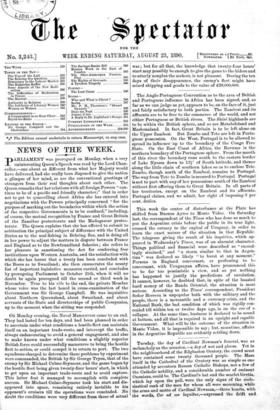On Monday evening, the Naval M.anceuvres came to an end.
They had lasted for ten days, and bad been planned in order to ascertain under what conditions a hostile fleet can maintain itself on an important trade-route, and intercept the traffic, always endeavouring to avoid a general engagement, and also to make known under what conditions a slightly superior British force could successfully manceuvre to bring the hostile fleet to action, or could compel it to return to port. The two squadrons charged to determine these problems by experiment were commanded, the British by Sir George Tryon, that of the enemy by Sir Michael Culme-Seymour, and the game began by the hostile fleet being given twenty-four hours' start, in which to get upon an important trade-route and to avoid capture. This latter feat it managed to accomplish with complete success. Sir Michael Culme-Seymour took his start and dis- appeared into space, remaining entirely invisible to his opponent's cruisers till the operations were concluded. No doubt the conditions were very different from those of actual war; but for all that, the knowledge that twenty-four hours' start may possibly be enough to give the game to the hiders and to utterly nonplus the seekers, is not pleasant. During the ten days of their disappearance, the enemy's fleet might have seized shipping and goods to the value of 220,000,000.


































